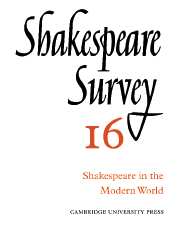Book contents
- Frontmatter
- An Obligation to Shakespeare and the Public
- Our Closeness to Shakespeare
- The Popularity of Shakespeare: An Examination of the Royal Shakespeare Theatre’s Repertory
- Shakespeare and the Fashion of These Times
- An Approach to Shakespearian Tragedy: The ‘Actor’ Image in Macbeth
- Shakespeare’s Impact Today in France
- Shakespeare and the Modern World
- Modern ‘Theatrical’ Translations of Shakespeare
- Shakespeare as ‘Corrupter of Words’
- Shakespeare in Ghana
- ‘Timon of Athens’
- Who Strutted and Bellowed?
- Shakespeare in Planché’s Extravaganzas
- ‘Our Will Shakespeare’ and Lope de Vega: An Unrecorded Contemporary Document
- Shakespeare and the Mask
- International Notes
- Shakespeare Productions in the United Kingdom: 1961
- Acting Shakespeare Today. A review of performances at the Royal Shakespeare Theatre, August 1962
- Canada’s Achievement
- 1 Critical Studies
- 2 Shakespeare’s Life, Times and Stage
- 3 Textual Studies
- Books Received
- Index
- Plate section
Acting Shakespeare Today. A review of performances at the Royal Shakespeare Theatre, August 1962
Published online by Cambridge University Press: 28 March 2007
- Frontmatter
- An Obligation to Shakespeare and the Public
- Our Closeness to Shakespeare
- The Popularity of Shakespeare: An Examination of the Royal Shakespeare Theatre’s Repertory
- Shakespeare and the Fashion of These Times
- An Approach to Shakespearian Tragedy: The ‘Actor’ Image in Macbeth
- Shakespeare’s Impact Today in France
- Shakespeare and the Modern World
- Modern ‘Theatrical’ Translations of Shakespeare
- Shakespeare as ‘Corrupter of Words’
- Shakespeare in Ghana
- ‘Timon of Athens’
- Who Strutted and Bellowed?
- Shakespeare in Planché’s Extravaganzas
- ‘Our Will Shakespeare’ and Lope de Vega: An Unrecorded Contemporary Document
- Shakespeare and the Mask
- International Notes
- Shakespeare Productions in the United Kingdom: 1961
- Acting Shakespeare Today. A review of performances at the Royal Shakespeare Theatre, August 1962
- Canada’s Achievement
- 1 Critical Studies
- 2 Shakespeare’s Life, Times and Stage
- 3 Textual Studies
- Books Received
- Index
- Plate section
Summary
It takes most young actors but five years' acute suffering to become effective, to become theatrical... .Beware of this and rather be ineffective.
G. Craig, On the Art of the Theatre (ed. 1957), p. 40.Gordon Craig's advice has been on record since 1907, and in England it has been disregarded. Rarely can an actor prepare a masterpiece. For the neophyte, training is huddled into two or three years and then he must make his name and establish himself as the man to be called upon for this type of role, or this kind of play. He cannot expect benefactions like a young painter and therefore he does not travel in pursuit of new ideas and experience, nor become a kind of apprentice to a master-craftsman. He cannot learn the rudiments of his art while practising it in a continuous but humble and responsible way, like a young poet, singer or dancer. Nor can an established actor plan his career to allow two or three years' study and experience of a major role before showing his interpretation to a wide public. In England today an actor does not find a suitable environment for full artistic development: he must choose continuous publicity or the forced pace of weekly or fortnightly changes of programme at a repertory theatre. (The few monthly repertory companies aspire to national publicity and so provide no true alternative.) An actor must become effective quickly and, if he wishes to continue to act, must always be effective.
- Type
- Chapter
- Information
- Shakespeare Survey , pp. 143 - 151Publisher: Cambridge University PressPrint publication year: 1963

